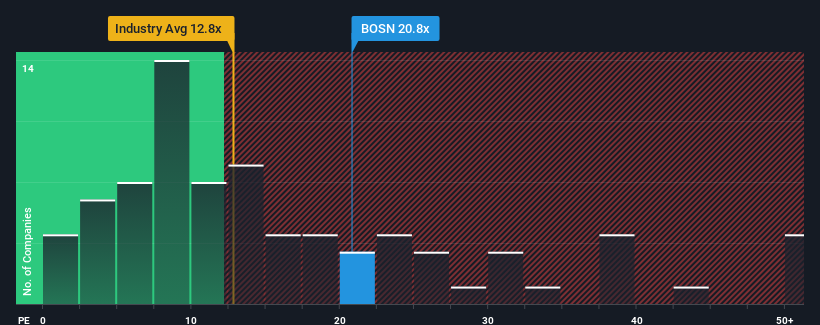- Switzerland
- /
- Trade Distributors
- /
- SWX:BOSN
Bossard Holding AG (VTX:BOSN) Investors Are Less Pessimistic Than Expected

It's not a stretch to say that Bossard Holding AG's (VTX:BOSN) price-to-earnings (or "P/E") ratio of 20.8x right now seems quite "middle-of-the-road" compared to the market in Switzerland, where the median P/E ratio is around 20x. However, investors might be overlooking a clear opportunity or potential setback if there is no rational basis for the P/E.
Earnings have risen at a steady rate over the last year for Bossard Holding, which is generally not a bad outcome. It might be that many expect the respectable earnings performance to only match most other companies over the coming period, which has kept the P/E from rising. If not, then at least existing shareholders probably aren't too pessimistic about the future direction of the share price.
See our latest analysis for Bossard Holding

What Are Growth Metrics Telling Us About The P/E?
Bossard Holding's P/E ratio would be typical for a company that's only expected to deliver moderate growth, and importantly, perform in line with the market.
Taking a look back first, we see that the company managed to grow earnings per share by a handy 6.8% last year. The latest three year period has also seen a 10% overall rise in EPS, aided somewhat by its short-term performance. So we can start by confirming that the company has actually done a good job of growing earnings over that time.
Weighing that recent medium-term earnings trajectory against the broader market's one-year forecast for expansion of 6.5% shows it's noticeably less attractive on an annualised basis.
In light of this, it's curious that Bossard Holding's P/E sits in line with the majority of other companies. Apparently many investors in the company are less bearish than recent times would indicate and aren't willing to let go of their stock right now. Maintaining these prices will be difficult to achieve as a continuation of recent earnings trends is likely to weigh down the shares eventually.
The Key Takeaway
Typically, we'd caution against reading too much into price-to-earnings ratios when settling on investment decisions, though it can reveal plenty about what other market participants think about the company.
We've established that Bossard Holding currently trades on a higher than expected P/E since its recent three-year growth is lower than the wider market forecast. When we see weak earnings with slower than market growth, we suspect the share price is at risk of declining, sending the moderate P/E lower. If recent medium-term earnings trends continue, it will place shareholders' investments at risk and potential investors in danger of paying an unnecessary premium.
Before you take the next step, you should know about the 2 warning signs for Bossard Holding that we have uncovered.
If P/E ratios interest you, you may wish to see this free collection of other companies with strong earnings growth and low P/E ratios.
Valuation is complex, but we're here to simplify it.
Discover if Bossard Holding might be undervalued or overvalued with our detailed analysis, featuring fair value estimates, potential risks, dividends, insider trades, and its financial condition.
Access Free AnalysisHave feedback on this article? Concerned about the content? Get in touch with us directly. Alternatively, email editorial-team (at) simplywallst.com.
This article by Simply Wall St is general in nature. We provide commentary based on historical data and analyst forecasts only using an unbiased methodology and our articles are not intended to be financial advice. It does not constitute a recommendation to buy or sell any stock, and does not take account of your objectives, or your financial situation. We aim to bring you long-term focused analysis driven by fundamental data. Note that our analysis may not factor in the latest price-sensitive company announcements or qualitative material. Simply Wall St has no position in any stocks mentioned.
About SWX:BOSN
Bossard Holding
Engages in the provision of industrial fastening and assembly solutions in Europe, America, and Asia.
Adequate balance sheet average dividend payer.
Market Insights
Community Narratives



